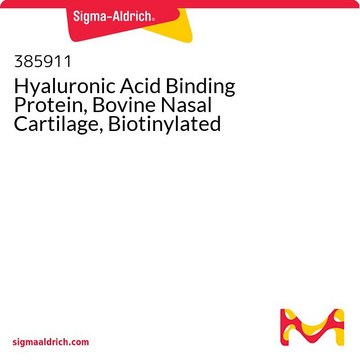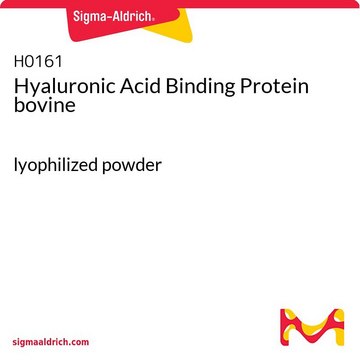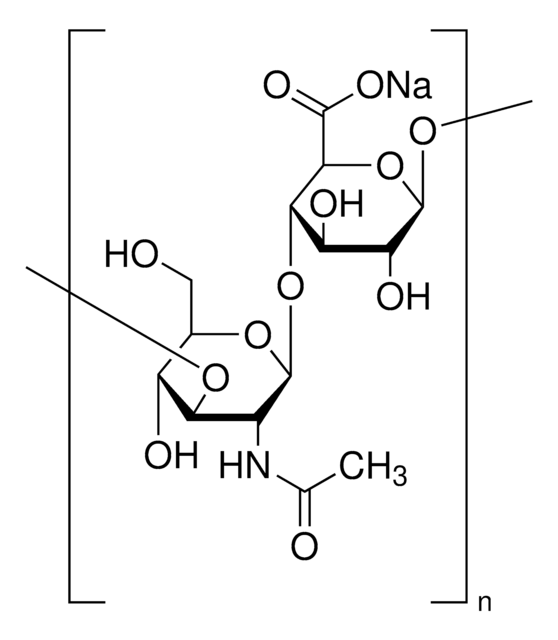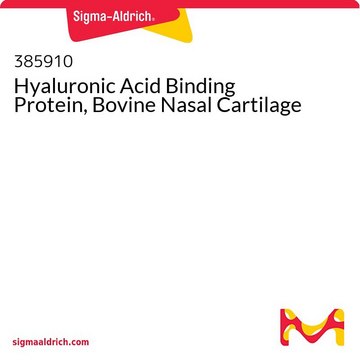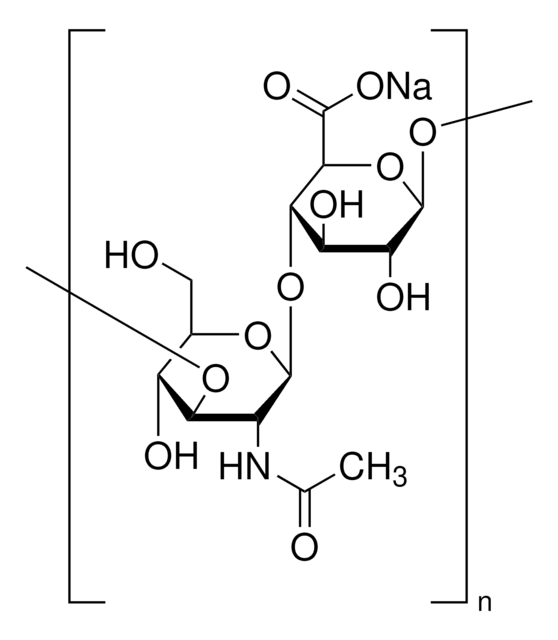H9910
Hyaluronic Acid Binding Protein−Biotin bovine
lyophilized powder
Sinónimos:
HABP-Biotin
Iniciar sesiónpara Ver la Fijación de precios por contrato y de la organización
About This Item
Productos recomendados
form
lyophilized powder
Quality Level
UniProt accession no.
storage temp.
−20°C
Gene Information
cow ... VCAN(282662)
Categorías relacionadas
Application
Hyaluronic acid binding protein-Biotin bovine has been used in the immunohistochemistry of human bone marrow samples for the detection of hyaluronic acid. It has been used for the detection of hyaluronan in Xenopus tadpoles.
Biochem/physiol Actions
May be useful for hyaluronic acid detection.
Physical form
Contains 1% bovine serum albumin, 0.85% NaCl, and 0.125% sodium phosphate.
Analysis Note
multiple bands on SDS-PAGE
Storage Class
11 - Combustible Solids
wgk_germany
WGK 2
flash_point_f
Not applicable
flash_point_c
Not applicable
Elija entre una de las versiones más recientes:
¿Ya tiene este producto?
Encuentre la documentación para los productos que ha comprado recientemente en la Biblioteca de documentos.
Los clientes también vieron
Esteban G Contreras et al.
Development (Cambridge, England), 136(17), 2987-2996 (2009-08-12)
Tail regeneration in Xenopus tadpoles is a favorable model system to understand the molecular and cellular basis of tissue regeneration. Although turnover of the extracellular matrix (ECM) is a key event during tissue injury and repair, no functional studies to
Chung-Hao Lu et al.
PloS one, 8(8), e74602-e74602 (2013-09-12)
The serpin peptidase inhibitor, clade E, member 2 (SERPINE2) inhibits urokinase-type plasminogen activator (PLAU) and tissue-type plasminogen activator. Higher SERPINE2 expression levels were detected in cumulus cells of human immature oocytes than in those of mature oocytes. The objective of
J Melrose et al.
Electrophoresis, 17(1), 205-212 (1996-01-01)
Hyaluronan influences cellular proliferation and migration in developing, regenerating and remodelling tissues and in tissues undergoing malignant tumour-cell invasion. The widespread occurrence of hyaluronan-binding proteins indicates that the recognition of hyaluronan is important to tissue organisation and the control of
Abraham Avigdor et al.
Blood, 103(8), 2981-2989 (2004-04-09)
Trafficking of human CD34+ stem/progenitor cells (HSCs/HPCs) is regulated by chemokines, cytokines, proteolytic enzymes, and adhesion molecules. We report that the adhesion receptor CD44 and its major ligand, hyaluronic acid (HA), are essential for homing into the bone marrow (BM)
G Perides et al.
The Journal of biological chemistry, 264(10), 5981-5987 (1989-04-05)
A glial hyaluronate-binding protein (GHAP) with an isoelectric point of 4.3-4.4 was isolated from human brain white matter. The 60-kDa glycoprotein appeared to be quite resistant to proteolysis, and comparison with GHAP from a viable glioma removed at surgery showed
Nuestro equipo de científicos tiene experiencia en todas las áreas de investigación: Ciencias de la vida, Ciencia de los materiales, Síntesis química, Cromatografía, Analítica y muchas otras.
Póngase en contacto con el Servicio técnico